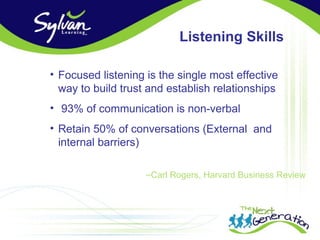
Listening Skills P P T
- 1. Listening Skills • Focused listening is the single most effective way to build trust and establish relationships • 93% of communication is non-verbal • Retain 50% of conversations (External and internal barriers) –Carl Rogers, Harvard Business Review
- 2. Name the Listener • Comparer • Rehearser • Derailer • Placater • Dreamer • Identifier • Filterer • Fixer • Mind Reader –Rick Farrell, Listening Skills are the New Art of Persuasion
- 3. Great Listeners • Ask what the person is thinking or feeling (Mind Reader) • Let the customer finish their thought before determining what question to ask next (Rehearser) • Be aware of your own assumptions (Filterer) • Stay present (Dreamer) • Remember that it’s about the customer, not you (Identifier)
- 4. Great Listeners • Treat each customer as the unique person they are (Comparer) • Circle the island (Derailer) • Empathize and ask questions when concerns are raised (Placater) • Fully understand needs before recommending a solution (Fixer)
- 5. Self Assessments 1. Rehearser 6. Dreamer 2. Mind Reader 7. Fixer 3. Identifier 8. Placater 4. Comparer 9. Derailer 5. Filterer
- 6. Focus on listening, concentrate the information and develop the best individual program for each family.